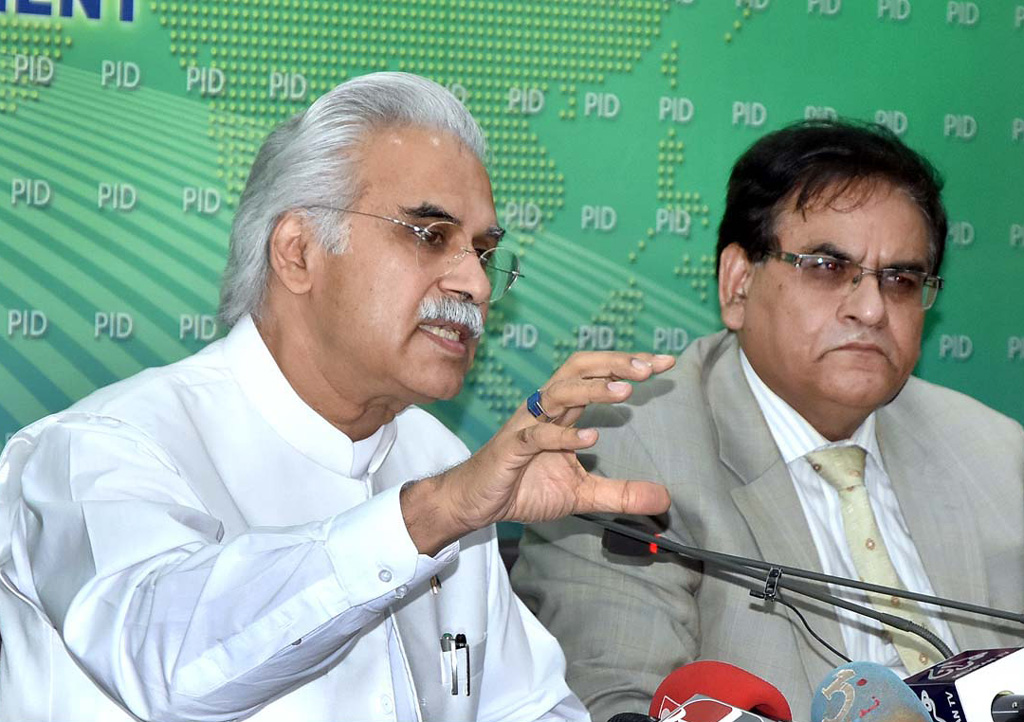Govt to ensure universal healthcare coverage for all: Zafar Mirza

ISLAMABAD: Minister of State for Health Services, Regulation and Coordination Dr. Zafar Mirza said the government would ensure universal healthcare coverage (UHC) for every individual including prevention, treatment, rehabilitation and palliative care.
Delivering the keynote address on ‘Health Vision of Government of Pakistan’organized by the Sustainable Development Policy Institute (SDPI), Dr Zafar said primary healthcare was the backbone and foundation for improved healthcare system in a country which was being ignored since long in Pakistan.
Dr. Zafar Mirza said owing to lopsided and inconsistent policies, Pakistan had become a hospital oriented country where primary healthcare was ignored and never considered as basic human right. 70 to 80 per cent budget of health go to big hospital, whereas Basic Health Units (BHUs) were not provided with much needed basic facilities.
In the context of 18th amendment, he said the major macro level programmes of health sectors, such as Hepatitis, Malaria and HIV control programmes were either weaken or closed largely due to lack of proper coordination among provinces and center.
Due to our irresponsible behavior towards these disease control programmes of national importance, which could be easily controlled, the prevalence of Hepatitis disease reached to dangerous 79 per cent in the country, he lamented.
He said devolution of power did not mean that the federal government was absolved from its national responsibilities.
The federal government could have a regulatory framework at the national level within the umbrella of 18th constitutional amendment.
He stressed the need for a well thought-out, integrative and effective national regulatory framework for health services.
He said population increase was our top national issue, which requires immediate interventions.
The contraceptive prevalence rate in Pakistan is 24 per cent, where around 4 million unwanted pregnancies can be controlled through provision of contraceptive measures.
He said with the current rate of population growth, by 2030, Pakistan would become 5th biggest population country of the world.
One of positive development under institutional reforms agenda of the current government was the merger of population department with health ministry, he added.
On health financing, Dr Zafar said Pakistan’s per capita spending on health was lowest and even below the minimum threshold standard to achieve the basic level of the universal health coverage. We need to change the discourse towards the health sector. At macro-economic framework level the directions need to be changed, where we need to invest into human capital which will lead to economic growth. For that we must ensure high quality health services, without which universal healthcare coverage (UHC) cannot be achieved. Health services shouldn’t be denied due to financing issues, which is critical integrated component of the healthcare system for UHC.
On question of tobacco control measures, he responded that the government abolished the third tier taxation structure and increased the duties, not only on tobacco products but on all hazardous products.
He said we were moving towards plan packaging and would make the tobacco Industry accountable. Measure would be taken to ensure that the health cost on diseases due to the tobacco products, should be paid by the same industry, he stressed.
Executive Director, SDPI Dr Abid Qaiyum Suleri said during the 2018 election campaign, prime minister Imran Khan expressed his attention for health justice, where a such system of health justice should be in place where income level could not be a hurdle in access to health facilities.
He said this resolve of the prime minister was expressed in the letter of intent of his government to the IMF, where social protection was the third major pillar of the programme, where previous IMF packages were focused only on fiscal consolidation and structural reforms.
























Comments
Comments are closed.